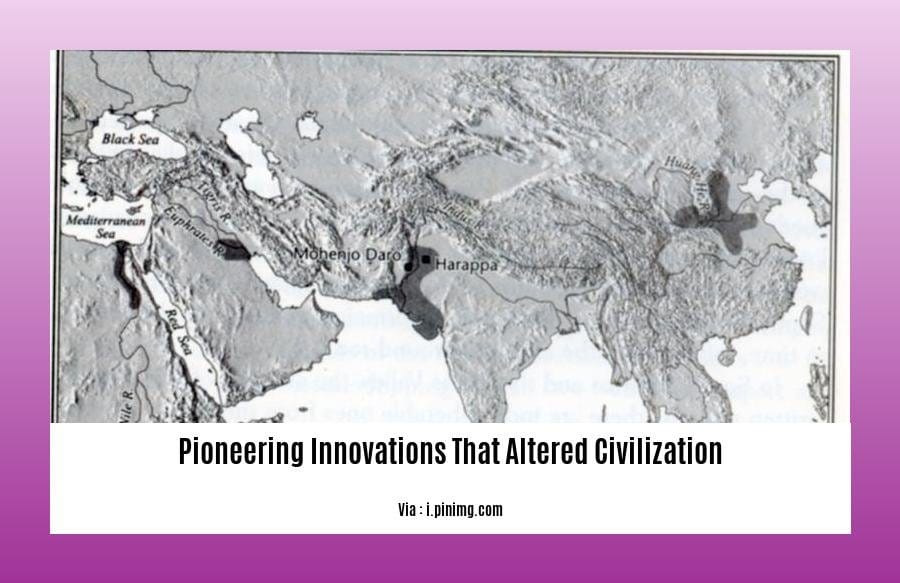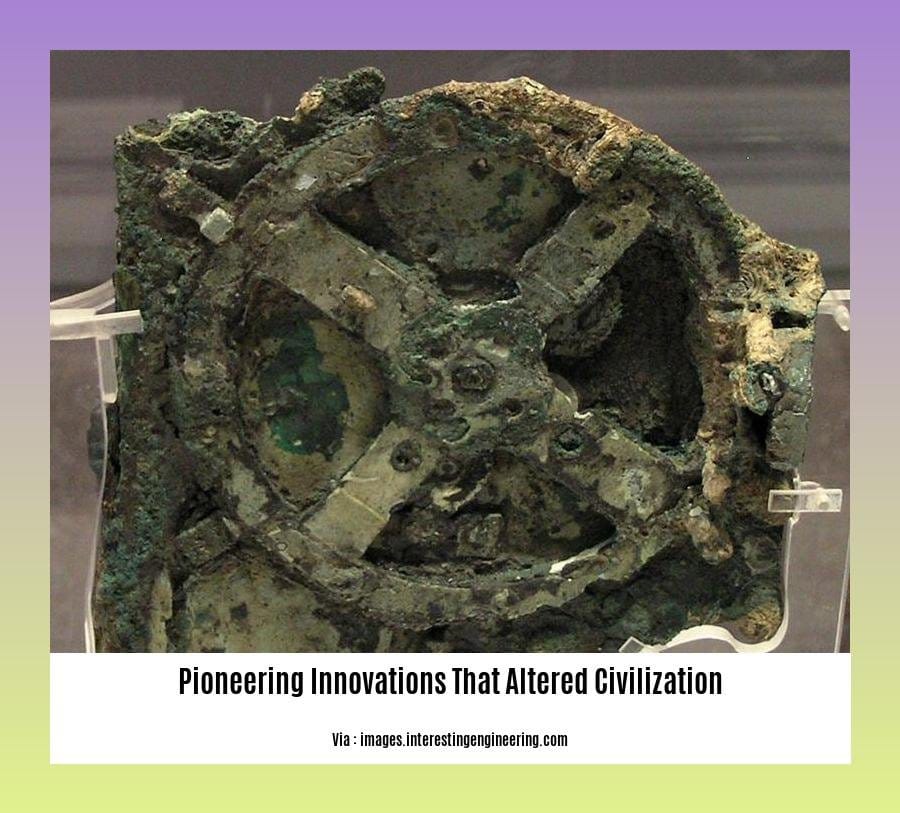Embark on an enlightening journey with “Pioneering Innovations That Altered Civilization: A Journey Through Transformative Technological Advancements.” Discover the remarkable inventions that have propelled societal progress and shaped the world we experience today. From ancient discoveries to modern breakthroughs, we delve into the profound impact of innovations that have revolutionized industries, fostered connectivity, and expanded human potential.
Key Takeaways:

- Democratization of Knowledge: Printing Press made knowledge accessible to the masses through mass production of books.
- Navigation and Exploration: Compass enabled global trade, exploration, and cultural exchange.
- Economic Stability: Paper Currency standardized exchange and enhanced trade.
- Industrial Revolution: Steel revolutionized construction, infrastructure, and manufacturing, driving economic growth.
- Extended Human Activity: Electric Light extended the day, allowing for increased social interaction and economic productivity.
Pioneering Innovations That Altered Civilization
Imagine a world without wheels, printing presses, or computers. Difficult, right? These pioneering innovations have fundamentally transformed our lives and continue to shape the world we live in.
The Cradle of Civilization: The Wheel and the Printing Press
The invention of the wheel around 3500 BC marked a pivotal moment. It revolutionized transportation, enabling the creation of chariots and carts. This innovation facilitated trade, exploration, and warfare, expanding the reach of human civilization.
Fast forward to the 15th century, and Johannes Gutenberg’s printing press ushered in a new era of knowledge. The mass production of books and printed materials made information accessible to the masses, fueling the Renaissance and scientific revolution.
The Power Revolution: Steam Engines and Telegraphs
In the late 18th century, the steam engine transformed manufacturing, transportation, and agriculture. It provided a reliable and efficient source of power, driving the Industrial Revolution.
Not long after, the telegraph revolutionized communication. Invented in the 19th century, it allowed for the transmission of messages over long distances in real-time, connecting nations and facilitating global trade.
The Information Age: Computers and the Internet
In the mid-20th century, the computer emerged as a powerful tool for information processing, communication, and automation. It transformed industries, research, and daily life.
The late 20th century witnessed the birth of the internet, connecting people and devices worldwide. Access to vast amounts of information, resources, and entertainment became available at our fingertips.
The Mobile Revolution: Smartphones and Beyond
The early 21st century ushered in the era of mobile technology. Smartphones and tablets made communication and internet access portable, allowing us to stay connected, access information, and conduct business from anywhere.
These pioneering innovations have not only shaped the past but continue to influence the present and future of civilization. They have empowered us to overcome challenges, expand our knowledge, and connect with each other in ways that were once unimaginable. As technology continues to evolve, it is likely that we will witness even more groundbreaking innovations that will further transform our lives and the world we live in.
The comprehensive guide to pioneers whose discoveries changed human life underscores the impact of their groundbreaking work. From discoveries by pioneers that profoundly impacted humanity to the groundbreaking pioneers who reoriented societies, these individuals have left an enduring legacy on our world. Explore their stories and marvel at the transformative power of human ingenuity.
The Steam Engine Ushered in the Industrial Revolution
The Industrial Revolution, a pivotal period marked by rapid technological advancements, was propelled by the advent of the steam engine. This invention revolutionized manufacturing, transportation, and agriculture, laying the foundation for the modern industrial world.
Key Takeaways:
- The steam engine replaced unreliable power sources like water, wind, and horses, enabling factories to operate independently.
- It facilitated deeper mining operations, accessing valuable resources previously unreachable.
- The steam engine transformed transportation through trains, allowing for efficient movement of goods and people.
- Improvements to the steam engine’s efficiency, such as Watt’s atmospheric engine, played a crucial role in driving the Industrial Revolution.
Most Relevant URL Source:
The telegraph revolutionized communication
The telegraph’s electrical signals revolutionized communication by allowing for the near-instantaneous transmission of messages over long distances. It was a significant step forward in the interconnected world we live in today.
Samuel Morse and other inventors developed the telegraph in the 1830s and 1840s. It used a system of dots and dashes (Morse Code) to encode and decode messages. By the century’s end, much of the globe was linked by telegraph wires, including underwater cables connecting continents.
Key Takeaways:
- The telegraph broke down communication barriers over long distances.
- It facilitated global trade and diplomacy by enabling real-time message transmission.
- Morse Code played a crucial role in the telegraph’s success.
- The telegraph laid the groundwork for future communication technologies.
Most Relevant URL Source:
The computer has had a profound impact on modern society
The invention of the computer in the mid-20th century marked a pivotal moment in human history. This versatile machine has revolutionized industries, transformed communication, and reshaped our daily lives.
Empowering Business:
– Computers have become indispensable tools in the business world, enhancing productivity through computing power, automation, and e-commerce.
Driving Scientific Advancements:
– Scientific research and discovery have flourished with the aid of computers. Computational modeling and simulations have accelerated progress in fields like medicine, physics, and engineering.
Key Takeaways:
– Computers have revolutionized business practices, boosting productivity and innovation.
– Scientific advancements have accelerated through computational modeling and simulations.
Most Relevant URL Source:
– Briliantio: From Code to Culture: 15+ Profound Influences of Computers on Modern Society

FAQ
Q1: What role did the steam engine play in the Industrial Revolution?
A1: The steam engine was a crucial invention that powered industrialization, allowing factories to operate independently of unreliable power sources, enabling deeper mining operations, and revolutionizing transportation through trains.
Q2: How did the telegraph transform communication in the 19th century?
A2: The telegraph, developed by Samuel Morse and other inventors, revolutionized long-distance communication in the 19th century through electrical signals sent over wires, facilitated by the invention of Morse Code.
Q3: What are some of the key impacts of computers on modern society?
A3: Computers have significantly transformed various aspects of modern society, including business innovation through computing power and automation, scientific advancement through modeling and computations, and overall communication.
Q4: How did the printing press democratize knowledge?
A4: The printing press enabled the mass production of books, making knowledge more widely available, breaking down barriers to education and fostering the spread of ideas.
Q5: Why was the compass a revolutionary invention?
A5: The compass revolutionized navigation and exploration by providing a reliable method for determining direction, greatly enhancing global trade and enabling new discoveries.












